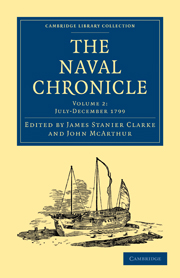 The Naval Chronicle
The Naval Chronicle Book contents
- Frontmatter
- PREFACE TO THE SECOND VOLUME
- PLATES from Original Designs by Mr. POCOCK
- BIOGRAPHICAL MEMOIR OF THE RIGHT HONOURABLE SAMUEL, LORD VISCOUNT HOOD
- MEMOIRS OF NAVIGATION AND COMMERCE, FROM THE EARLIEST PERIODS
- BIOGRAPHICAL MEMOIR OF THE LATE ADMIRAL SIR CHARLES KNOWLES'S SERVICES IN RUSSIA, DURING THE YEARS 1770, 1771, 1772, 1773, AND 1774
- BIOGRAPHICAL MEMOIR OF THE RIGHT HONOURABLE LORD HUGH SEYMOUR
- MEMOIRS OF NAVIGATION AND COMMERCE, FROM THE EARLIEST PERIODS
- HISTORICAL MEMOIR OF NAVAL TRANSACTIONS, DURING THE PRESENT WAR, FROM ITS COMMENCEMENT IN 1793
- BIOGRAPHICAL MEMOIR OF THE LATE CAPTAIN JAMES ALMS, SEN
- INDEX
- CHRONOLOGICAL LIST OF Naval Events, DURING THE YEAR 1799
- APPENDIX
- NAVAL PILLAR, TO PERPETUATE THE GLORIOUS VICTORIES OF THE BRITISH NAVY
APPENDIX
Published online by Cambridge University Press: 10 January 2011
- Frontmatter
- PREFACE TO THE SECOND VOLUME
- PLATES from Original Designs by Mr. POCOCK
- BIOGRAPHICAL MEMOIR OF THE RIGHT HONOURABLE SAMUEL, LORD VISCOUNT HOOD
- MEMOIRS OF NAVIGATION AND COMMERCE, FROM THE EARLIEST PERIODS
- BIOGRAPHICAL MEMOIR OF THE LATE ADMIRAL SIR CHARLES KNOWLES'S SERVICES IN RUSSIA, DURING THE YEARS 1770, 1771, 1772, 1773, AND 1774
- BIOGRAPHICAL MEMOIR OF THE RIGHT HONOURABLE LORD HUGH SEYMOUR
- MEMOIRS OF NAVIGATION AND COMMERCE, FROM THE EARLIEST PERIODS
- HISTORICAL MEMOIR OF NAVAL TRANSACTIONS, DURING THE PRESENT WAR, FROM ITS COMMENCEMENT IN 1793
- BIOGRAPHICAL MEMOIR OF THE LATE CAPTAIN JAMES ALMS, SEN
- INDEX
- CHRONOLOGICAL LIST OF Naval Events, DURING THE YEAR 1799
- APPENDIX
- NAVAL PILLAR, TO PERPETUATE THE GLORIOUS VICTORIES OF THE BRITISH NAVY
Summary
ADDITIONS AND CORRECTIONS,
TO THE EDITOR.
Penzance, Aug. 28th, 1799.
A relation of Dr. W. Borlase, author of the Natural History of Cornwall, but a much nearer one of Captain W. Tremenheere, of the Marines, is desirous of rectifying an error (perhaps of the press) in your valuable publication, The Naval Chronicle, (vol. i. page 474.) giving an account of Penzance.
“Mr. Pennant informs us that the numbers (of pilchards) taken at one shooting of the nets is amazingly great. Dr. Berlase assured him, that on the 5th October, 1767, there were, at one time, enclosed in St. lve's Bay, 7000 hogsheads, each hogshead containing 35,000 fish–in all 245,000,000.”
The fact is, that a hogshead never contains more than 3,500 fish, seldom, indeed, so many; the difference is therefore immense. Yours, J. T.
Page 263, line 21. Lieutenant Parkinson was promoted at the immediate request of the King of Naples. This spirited officer was Lieutenant of the Vanguard, in the action off the Nile. Captain Parkinson was brought up in the school of Lord Hood; he was Lientenant of the Dido in her action with the Minerva, in 1793.
A friend to the Naval Chronicle begs leave to correct an error in the account of the officers employed in the destruction of the arsenal at Toulon; which is, that Captain Richard Gambier Middleton, who now commands in the Mediterranean, was not the officer who was on board the Britannia at that time.
- Type
- Chapter
- Information
- The Naval ChronicleContaining a General and Biographical History of the Royal Navy of the United Kingdom with a Variety of Original Papers on Nautical Subjects, pp. 660Publisher: Cambridge University PressPrint publication year: 2010First published in: 1799


